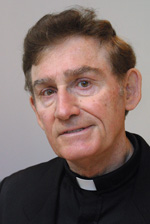Pope Francis made what some would consider harsh statements in his Christmas message to the Roman Curia. He warned the cardinals and archbishops assembled of “the terrorism of gossip,” of being part of a clique that “enslaves all its members, becoming ‘a cancer’ that threatens the harmony of the body and causes so much illness,” and of “spiritual Alzheimer’s,” or forgetting what drew them to the priesthood in the first place.
Pope Francis said that the Curia, those who make up the Catholic Church’s governing body, is “called on to always improve itself and grow in communion, holiness and knowledge to fulfill its mission. But even it, as any human body, can suffer from ailments, dysfunctions, illnesses.”
That hardly made for a cheerful Christmas message. But what was he trying to say? To understand Pope Francis’ thinking, we may want to look at religious orders.
Some religious orders were founded to carry out reforms because its members felt as if inspiring examples of Christ’s teachings were lacking. Reform was needed to revitalize religion, spawn saints and to establish revitalized centers for meaningful worship. As time passed, however, so did reforms. But the church saw repeated religious renaissances.
[hotblock]
One way to interpret Pope Francis’ Christmas message is to view it as a call for a much-needed renaissance and revitalization of religion in postmodern times. Although Pope Francis addressed the Curia, his message also speaks to the world.
When I was traveling in Germany with a friend, he said to me: “You Americans have big appetites.” This is true of humanity, not just Americans. For example, the amount of food on supermarket shelves tempts us to appease our appetites. The saying, “The more you get, the more you want,” holds true for many, as does a big appetite for gossip and for forgetting to count the blessings we have.
Down deep, we crave a healthy orderly life and know that better controlling our lives is the best way to attain true, lasting joy. We are especially happiest when doing something good and wholesome for ourselves that leads to doing something good for another.
I believe this is the underlining reason behind Pope Francis’ seemingly harsh words. He is calling for a postmodern renaissance. He wants to lift our spirituality to new heights. This requires change and, yes, death to disorderly appetites and bad habits. And yet, when we admit that these things enslave us and let go, we experience the joy of freedom.
And that’s the joy Pope Francis desires for all of us.




The call to examination, renewal and revitalization are all wonderful, as are the physical analogies to such things as “spiritual Alzheimer’s.” I think the pope’s messages are very clear. Yet I question why the use of the word “postmodern.” This seems truly unfortunate and a forced draw from the secular world. Jesus’ message to us in the gospel will ALWAYS be timeless. If anything what it takes first is *less* a look at the world and a simple return to the gospel. If there is any application to a more modern world it is then a matter of translation from the gospel to the times. But I FEAR it is too often the other way around. The gospel is not to change or be perverted by the messages of the times.